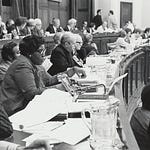
Today, a radicalized Republican party insists that the actual, complex, and often violent American past is not only false but divisive, left-wing, anti-white propaganda. It is not intended to teach the facts of history, GOP firebrands argue, but to indoctrinate helpless children with left ideology. As a result, around the country, much of the historical scholarship that twentieth-century historians fought to get into the high school curriculum is being systematically and forcibly censored.
Seven states, most famously Florida, now ban the teaching of race in public schools, while legislatures in 16 more states are contemplating similar bans. And under the rubric of “parental rights,” Florida has also banned classroom materials that address sex and gender: similar bills are also advancing in 26 other state legislatures. Even classic books are being removed from classrooms and public libraries.
But historians, like librarians, community activists, and high school teachers, are pushing back. A few months ago, a new collection of essays edited by Princeton University historians Kevin Kruse and Julian Zelizer hit the bookstores, and readers are snapping it up. In Myth America: Historians Take on the Biggest Legends and Lies About Our Past (Basic Books, 2022), twenty historians discuss key themes and issues from our national past that the GOP’s right-wing loves to politicize but doesn’t tell the truth about.
Program notes:
You can listen to Amy Goodman’s complete interview with Howard Zinn here and learn more about the impact of A People’s History of the United Society States at the Zinn Education Project website.
Claire mentions “history from the bottom up” in her introduction. This school of history arose in England and the United States at approximately the same time and was heavily influenced by Marxism. To learn more, see Staughton Lynd, Doing History from the Bottom Up: On E.P. Thompson, Howard Zinn, and Rebuilding the Labor Movement from Below (Haymarket Books, 2014.)
At the beginning of the interview, Claire mentions two other historians who challenged the patriotic narrative: Gerda Lerner, who jumpstarted the field of women’s history with her book The Grimké Sisters from South Carolina: Pioneers for Women's Rights and Abolition (University of North Carolina Press, 1967) and James Loewen, who challenged the textbook industry with Lies My Teacher Told Me: Everything Your American History Textbook Got Wrong (The New Press, 1995.)
Julian refers to Donald J. Trump’s patriotic history project, the 1776 Commission, which was created by executive order on November 2, 2021: no professional historian was appointed to the commission.
Kevin brings up Karen L. Cox’s essay about the origins and purpose of Confederate monuments: interested listeners may wish to read Cox’s book, No Common Ground: Confederate Monuments and the Ongoing Fight for Racial Justice (University of North Carolina Press, 2021.)
Julian discusses Michael Kazin’s essay about socialism in the United States: the idea that the lack of socialism made the United States unusual among industrialized countries originated with sociologist Werner Sombart in his classic Why Is There No Socialism in the United States? (1906.)
Kevin mentions historian of France David Bell and his essay on American exceptionalism: you can hear Bell discuss this essay on Professor Buzzkill’s History Podcast (January 24, 2022.)
Kevin also notes that American exceptionalism has been used differently over time: American Marxists used the concept to explain their lack of success in the United States during the 20th century, and Julian discusses how Speaker of the House Newt Gingrich politicized and manipulated the phrase differently in the 1990s.
Kevin and Claire also discuss how mythic history can have political outcomes and the long-term influence of The Dunning School.
Claire mentions Alan Brinkley’s influential book about World War II as the “Fourth New Deal,” The End Of Reform: New Deal Liberalism in Recession and War (Oxford University Press, 1996.)
Julian speaks out against politicians becoming involved with education standards and references the new laws in Florida.
Julian references Eric Alterman’s book Lying in State: Why Presidents Lie -- And Why Trump Is Worse (Basic Books, 2020.)
Kevin refers to Republican denials that they ever had a “Southern Strategy” that sought to bring the South into the GOP by adopting causes associated with massive resistance to racial equality. Interested listeners may wish to read Kevin’s White Flight: Atlanta and the Making of Modern Conservatism (Princeton University Press, 2005.)
Claire mentions the controversy over the Advanced Placement African American Studies course in Florida and Lynn Cheney’s attack on the National History Standards in 1994.
Kevin discusses Glenda Gilmore’s essay about the civil rights movement. Listeners who want to know more can read Gilmore’s Defying Dixie: The Radical Roots of Civil Rights, 1919-1950 (W.W. Norton, 2009.)
You can download this podcast here or subscribe for free on Apple iTunes, Spotify, Google Podcasts, or Soundcloud. Do you use another service? Let me know in the comments, and I will submit it to them!













Share this post